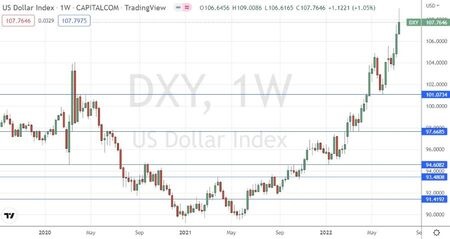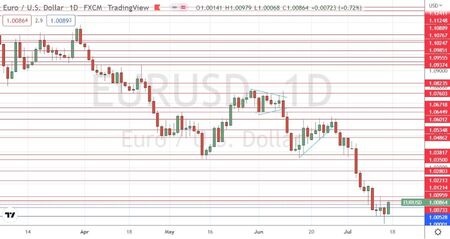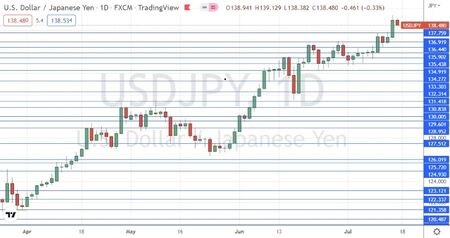Get the Forex Forecast using fundamentals, sentiment, and technical positions analyses for major pairs for the week of July 18, 2022 here.
The difference between success and failure in Forex / CFD trading is very likely to depend mostly upon which assets you choose to trade each week and in which direction, and not on the exact methods you might use to determine trade entries and exits.
So, when starting the week, it is a good idea to look at the big picture of what is developing in the market as a whole, and how such developments and affected by macro fundamentals, technical factors, and market sentiment. Read on to get my weekly analysis below.
Fundamental Analysis & Market Sentiment
I wrote in my previous piece last week that the best trades for the week were likely to be:
- Short of EUR/USD following a daily (New York) close below $1.0100. This set up at the end of Monday, but the price ended the week higher by 0.45%.
- Long of USD/JPY following a daily (New York) close above €136.66 (ideally €137.00). This set up at the end of Monday, but the price ended the week higher by 0.80%.
My forecast produced a profit of 0.35%.
The news is currently dominated by the lowering inflation expectations which have emerged since Wednesday’s surprisingly high 9.1% US CPI print. The high inflation initially led to a stronger belief that the Fed would hike rates by 0.75% or even a full 1% at its next meeting, but the slightly stronger than expected US retail sales data released Friday plus lowering inflation expectations, lowering import price inflation, and another fall in manufacturing data, all suggests a 0.75% rate hike is most likely. This saw stocks rise at the end of the week and the US Dollar give up some of the gains it made earlier in the week.
After more than four months, the war in Ukraine has partly faded away from its former place as a lead news item and appears to be having little effect on markets except a possible weighing on global recession fears. Although there was much talk about a rise in the prices of agricultural commodities such as Wheat and Corn, recent weeks have seen strong falls in the prices of commodities.
The outlook regarding risk appetite is unclear. The US stock market is still in a bear market, but rose again last week, although the US yield curve remains inverted. The US Dollar Index rose again over the week, closing at yet another new 20-year high.
The past week has seen overall directional movement fall in the Forex market, despite the US Dollar advancing.
There were a few important economic data releases last week, which is why market volatility remained strong. The results came in as follows:
-
US CPI – an annualized rate of 9.1% with a broad increase across sectors initially alarmed the market, which had only been expecting a new inflation rate of 8.8%.
-
Chinese GDP data – rising by only 0.4% compared to the 1.2% which had been expected.
-
US Retail Sales data – came in stronger than expected, showing a month on month rise of 1.0%, compared to the 0.7% which had been expected.
-
RBNZ Official Cash Rate & Rate Statement – the RBNZ hiked rates by 0.50% to 2.50%, which had been widely expected.
-
Bank of England testimony before UK parliament
-
Bank of Canada’s Overnight Rate, Rate Statement, and Monetary Policy Report – the BoC raised rates by a full 1.00% to 2.50%, when a hike of only 0.75% had been expected.
-
US PPI data – came in higher than expected, showing a month-on-month increase of 1.0%.
-
Australian Employment data
-
US Preliminary UoM Consumer Sentiment data
The Forex market saw yet another strong advance by the US Dollar last week. The advance was broad: the USD closed at long-term high weekly closing prices against every single major currency in the Forex market except the Swiss Franc. The Euro was especially weak, and the EUR/USD currency pair reached a new 19-year low below parity more than once, although notably, EUR/USD refuses to spend much time below $1.0000.
The historically low values we are seeing in the Euro and the Japanese Yen are likely to put their central banks, both of which are reporting this week, under pressure.
Rates of coronavirus infection globally dropped last week for the first time since May, suggesting that we may not be seeing the start of a significant new variant wave after all. The most significant growths in new confirmed coronavirus cases overall right now are happening in Belgium, Bulgaria, Montenegro, North Macedonia, Peru, Romania, Serbia, Albania, Barbados, Bolivia, Cyprus, Guatemala, Italy, Japan, Lebanon, Mexico, New Zealand, Paraguay, Switzerland, and Tunisia.
The Week Ahead: 18th July – 22nd July 2022
The coming week in the markets is likely to show a similar level of volatility to last week, as there are several high-impact data releases scheduled. They are, in order of likely importance:
-
European Central Bank Main Refinancing Rate & Monetary Policy Statement
-
Bank of Japan Outlook Report
-
British CPI data
-
Canadian CPI data
-
New Zealand CPI data
-
US Flash Services PMI data
-
German Flash Manufacturing & Services PMI data
-
Australian Monetary Policy Meeting Minutes
It is a public holiday in Japan on Monday 18th July.
Teknik Analiz
U.S. Dollar Index
The weekly price chart below shows the U.S. Dollar Index printed a large bullish candlestick which closed at a new 20-year high, in line with the long-term trend, which is bullish. This is significant as breaks to new high closes suggest the price will rise further over the coming days. However, note there is a very large upper wick, and that the price did not advance on Friday, so we may have seen a climax suggesting the price will not rise further soon.
Nevertheless, it looks wise to trade the US Dollar long over the coming week once it starts rising again on shorter time frames. This is a very powerful, long-term trend in the most important currency in the Forex market.
US Dollar Index Weekly Chart

EUR/USD
Recent weeks and months have seen a lot of strength generally in the US Dollar, but the Euro is also standing out lately as an especially weak currency due to concerns over the ECB running out of options to tackle resurgent inflation, making the EUR/USD currency pair potentially exciting to trade short.
The price fell strongly again last week, just touching parity twice before dipping substantially below $1.000, and then making its lowest weekly close in 19 years despite a bullish rebound at the end of the week. The daily chart saw the week conclude with a strong and bullish engulfing bar, suggesting we may be about to see a rise in the price. If this bullish bar is taken out by a strong bearish reversal, that would be a very bearish sign.
I suggest waiting for a daily close below $1.0000 before considering entering a short trade here.
EUR/USD Daily Chart

USD/JPY
A strong advance by the US Dollar is nothing new, but the Japanese Yen has begun to weaken again after consolidating for a while. This saw the price here rise strongly over the week, reaching new highs not seen for decades.
Breakouts are typically more powerful after periods of consolidation, and we had seen the price trade quite tightly below recent long-term highs.
The Bank of Japan and other Japanese policy makers may be unhappy with the Yen depreciating much further, but it seems unlikely that they will be able to do anything about it, as raising rates would jeopardize their project of reflating Japan’s economy, which is experiencing a rate of inflation well below the 2% target, putting this economy into a very different position compared to rest of the G7 or even G20 economies.
I am prepared to take a long trade in this currency pair if we get a daily (New York) close above €138.92 (ideally above the round number at ¥139.00).
USD/JPY Daily Chart

Bottom Line
I see the best opportunities in the financial markets this week as likely to be:
- Short of EUR/USD following a daily (New York) close below parity ($1.0000).
- Long of USD/JPY following a daily (New York) close above €138.92 (ideally €139.00).
Ready to trade our Forex weekly forecast? Here is a list of some of the best Forex trading platforms to check out.

